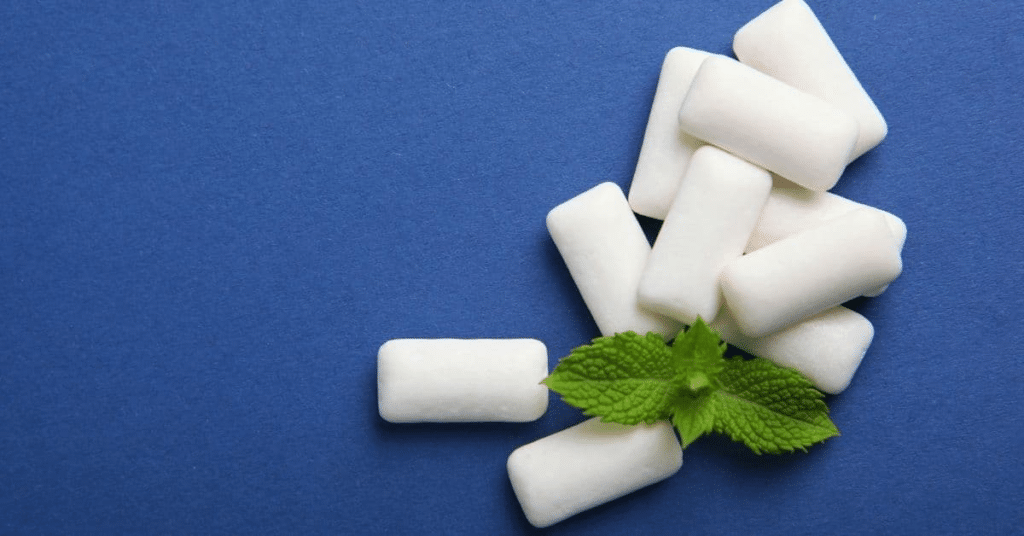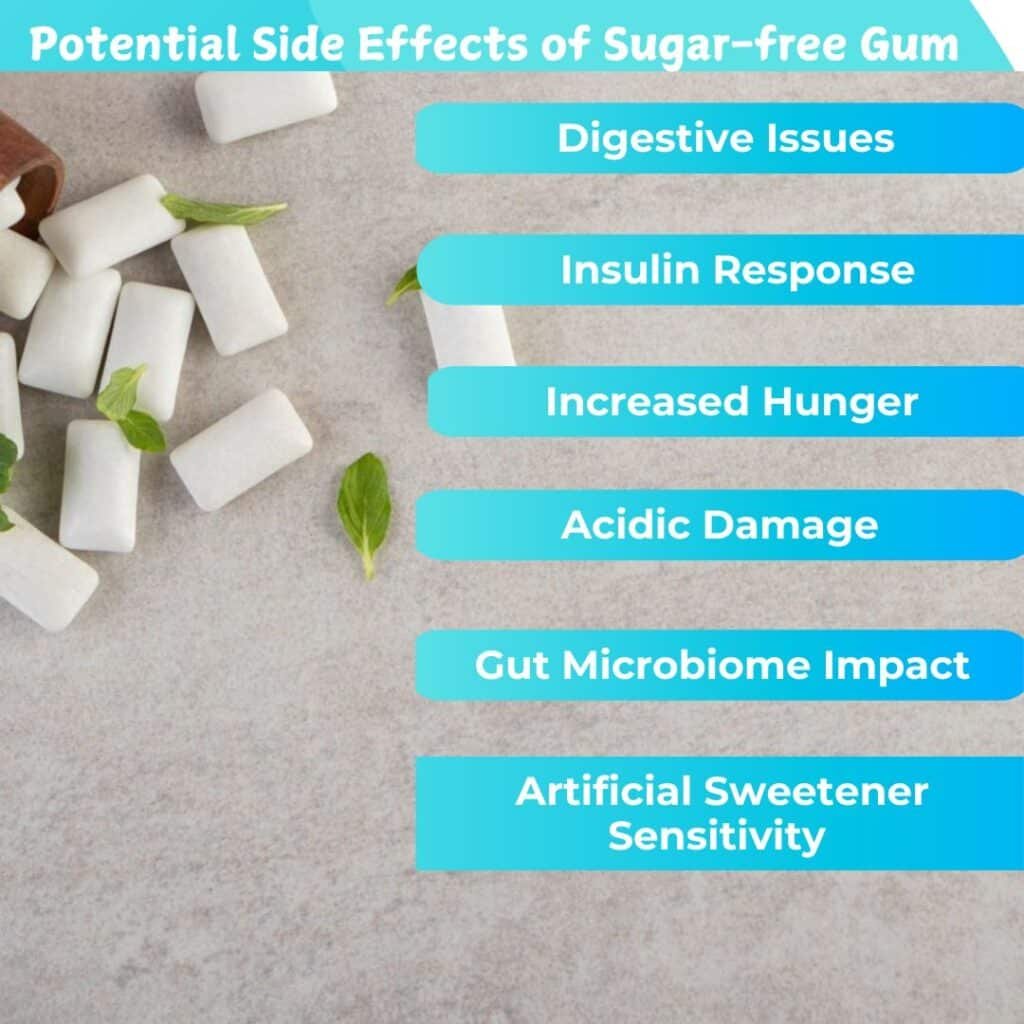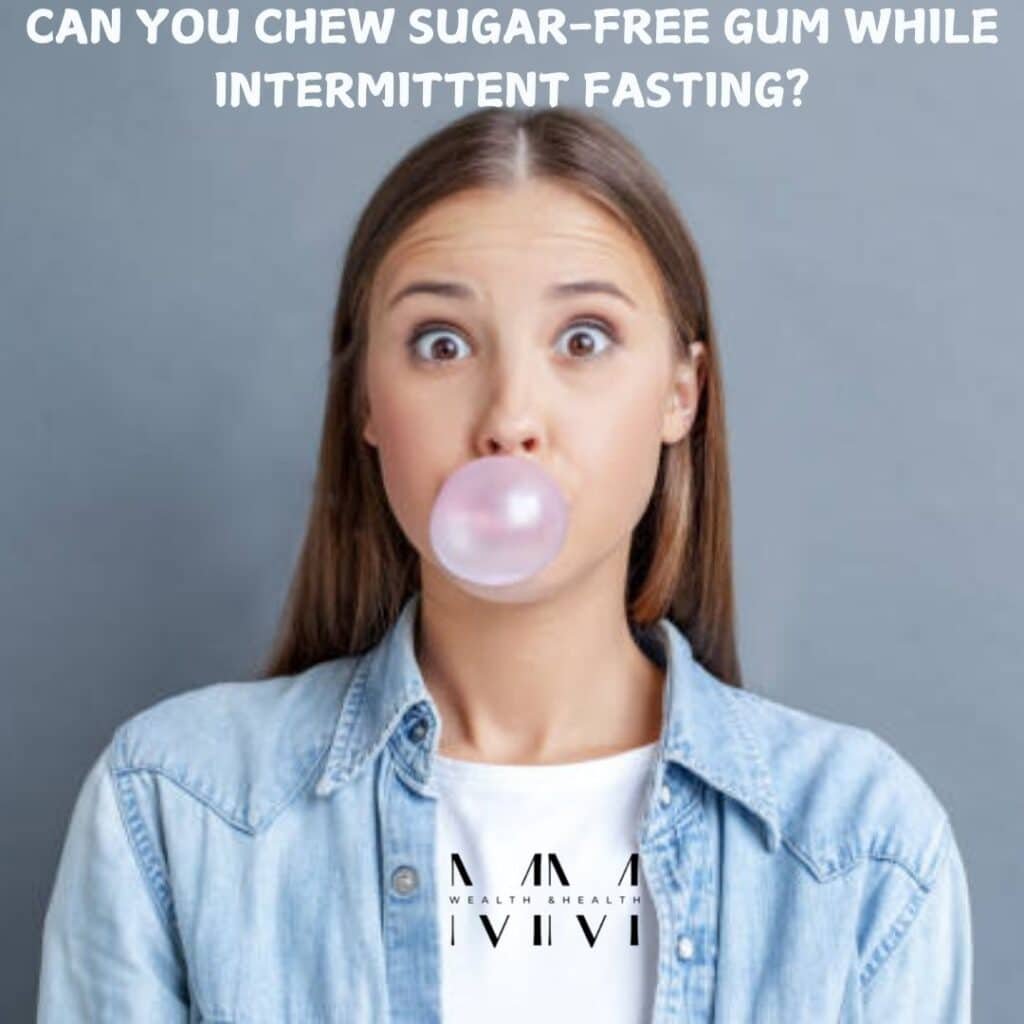Sugar-Free Gum – Friend or Foe?
You’re halfway through your fasting window when a craving hits. Your stomach growls, your focus wavers, and your hand instinctively reaches for a stick of sugar-free gum. But wait, can you chew sugar-free gum while intermittent fasting? IF has skyrocketed in popularity in recent years, and for good reason, improved insulin sensitivity, better metabolic health, and weight loss are just a few benefits. But let’s face it, fasting isn’t always easy. That’s why we’re dissecting the gray area of sugar-free gum. Can it be your ally, or is it a wolf in sheep’s clothing? Let’s chew through the facts.

Intermittent Fasting – Why Every Bite (or Chew) Matters?
Before we delve into the topic of gum, it’s essential to revisit the fundamental principles of intermittent fasting. This eating pattern alternates between designated periods of eating and intervals of fasting. During the fasting phase, your body transitions into a state where it primarily burns fat, leading to various metabolic benefits. The overarching objective is to maintain a fasted state, which helps keep insulin levels low, stabilizes blood sugar, and encourages your metabolism to utilize stored fat for energy.

It’s important to note that even a tiny intake of calories or an unanticipated insulin spike can disrupt this delicate process. Intermittent fasting (IF) is distinct from traditional diets in that it emphasizes when you eat instead of what you eat. Popular methods of IF include the 16/8 approach, which involves 16 hours of fasting followed by an 8-hour eating window, and the 5:2 diet, where you consume a regular diet for five days and limit calorie intake on two non-consecutive days.
The ultimate aim is to allow your body to enter a fasted state, facilitating fat burning and enhancing metabolic function. So, what can you enjoy during your fasting window? Beverages such as black coffee, herbal tea, and plain water are highly recommended. These options are virtually calorie-free and do not activate your digestive system, allowing you to maintain your fast without interruption.
But gum? Well, that’s where things get sticky.
Sugar-Free Gum – What’s Hiding in That Tiny Piece?
Let’s unwrap a stick of sugar-free gum. Unlike regular gum, which packs grams of sugar, sugar-free versions swap actual sugar for artificial sweeteners (like aspartame) or sugar alcohols (like xylitol). These non-nutritive sweeteners deliver that sweet taste without the caloric baggage—most sugar-free gums contain 2–5 calories per piece, thanks to the gum base (a mix of resins, fillers like titanium dioxide, and flavorings).

But here’s the twisting point not all sugar-free sweeteners are created equal. So, all that matters is, the type of gum that you choose. For example:
- Xylitol: A sugar alcohol that’s kind to your dental health (it fights tooth decay!) but can cause a laxative effect if you go overboard.
- Aspartame: A calorie-free artificial sweetener that’s controversial for its potential to trigger insulin response in sensitive people.
- Stevia: A natural sweetener that’s less likely to mess with your insulin levels.
Can you chew sugar-free gum while intermittent fasting?
When it comes to fasting, opting for sugar-free chewing gum can be an acceptable choice in a small amount, as it contains minimal calories, typically less than 6 calories, and no sugar. This means that chewing sugar-free gum should not trigger insulin production, allowing you to maintain your fast without concern.
It is important to remember, however, that moderation is key. While sugar-free gum is generally safe during fasting, excessive consumption could lead to a small intake of calories. Therefore, it’s advisable to keep your gum chewing to a reasonable limit by understanding the caloric value.
When selecting a sugar-free gum, be sure to check the nutritional information on the packaging. Look for options that do not contain sugar and have no more than 2 grams of total carbohydrates. Also, consider the potential side effects of consuming high amounts of non-nutritive sweeteners, as they may negatively impact your gut microbiome.
The answer boils down to many factors like caloric intake, insulin response, and a few more. Let’s break it down like a pro.
1. Calories – How Much is Too Much?
A typical piece of sugar-free gum has fewer than 5 calories. Technically, anything above zero calories “breaks” a fast. However, most health professionals agree that anything under 50 calories has minimal impact on your fasting state. You’d need to chew 10+ sticks of gum to hit that threshold, and let’s be real, your jaw would tap out long before then. For those adhering to a strict caloric intake during fasting periods, even these small amounts might be a consideration.
Good news! – A stick or two won’t break your weight loss goals or any specific goal.
2. Insulin Response
This is where things get spicy. One of the primary concerns during fasting is maintaining stable insulin levels. Some artificial sweeteners can trigger an insulin response, even in the absence of actual sugar. However, studies have shown that sugar alcohols like xylitol have a negligible effect on blood sugar levels, making them a preferable choice for those monitoring their insulin response. Some studies suggest artificial sweeteners might trick your brain into expecting sugar, causing a slight insulin spike. But here’s the twist of scientific studies that are mixed.
For instance:
Sucralose might raise insulin levels in some people.
Stevia and monk fruit (natural sweeteners) are less likely to ruffle your metabolic state.
The choice is yours – If you’re fasting for metabolic health or insulin sensitivity, opt for gums with natural sweeteners.
3. The Act of Chewing and digestive responses
Chewing gum isn’t just about fresh breath—it’s a psychological game. The mere act of chewing can stimulate the digestive system, signaling the body to prepare for food intake. This can increase saliva production and trigger hunger signals, potentially making fasting more challenging for some individuals. However, for others, chewing gum is an appetite suppressant, helping to manage cravings during the fasting window. The act of chewing boosts saliva production and blood flow, which can:
Tame hunger pangs: Trick your digestive system into thinking food’s coming.

Trigger cravings: If the sweet taste primes your brain for a snack, you might cave post-gum.
Pro tip: Pair your chewing gum break with a cup of green tea or keto coffee for a double dose of appetite suppression.
4. Oral Health Benefits
Chewing sugar-free gum has been associated with several oral health benefits. It increases saliva flow, which helps neutralize acids, reduce tooth decay, and improve overall oral hygiene. For those concerned about bad breath during fasting periods, sugar-free gum can be a good option to maintain fresh breath without compromising the fast significantly.
Why You Might Want to Chew Sugar-Free Gum While Fasting
Sugar-free gum isn’t just a breath saver, it could be your fasting sidekick. Check out the below list and know better.
Crushes Sugar Cravings: Pop a stick when sugar cravings strike. The sweet taste (without the sugar content) can keep you from raiding the cookie jar.
Boosts Oral Health: More saliva = fewer bacteria = fresher breath and less tooth decay.
Suppresses Appetite: Distract your brain and stomach during the toughest hours of your fasting schedule.
Sharpens Focus: Chewing increases blood flow to the brain, giving your brain function a subtle boost.
Potential Side Effects of Sugar-free Gum
While sugar-free gum offers benefits, it’s essential to be aware of potential side effects. Consuming large quantities of sugar alcohol can lead to:
Tummy Troubles: Sugar alcohols like xylitol are famous for their laxative effect. Chew too many sticks, and your digestive system might stage a protest.

Cravings for Steroids: For some, artificial sweeteners amplify sugar cravings. If you’re prone to binges, tread carefully.
The Insulin Question: If your fasting goals include improving insulin sensitivity, those non-nutritive sweeteners might be a gamble.
What Do the Experts Say?
Health professionals suggest that the impact of chewing sugar-free gum during intermittent fasting varies based on individual goals and responses. For those practicing fasting for metabolic health or weight loss, the minimal calories in sugar-free gum are unlikely to disrupt progress. However, individuals fasting for religious purposes or autophagy may choose to avoid any intake that could break the fasted state.
Dr. Michael Mosley (Creator of the 5:2 Diet): Chewing sugar-free gum during fasting periods can help manage hunger without significantly impacting insulin levels.
Nutritionists: “Choose stevia-sweetened gum. It’s the best option for minimal insulin response.”
Dentists: “Sugarless gum is a win for oral hygiene—just avoid sugary gum like the plague.”
How to Pick Fasting-Friendly Gum
When it comes to incorporating gum into your fasting routine, it’s essential to choose wisely. Not all gums are created equal, and picking the wrong one can disrupt your fasting goals. Here are some guidelines to help you make the best choice:
1. Calorie Check: Choose gums that contain fewer than 5 calories per stick. This ensures that you’re keeping your caloric intake minimal during your fasting period, helping you stay on track.
2. Sweetener Smarts: Be wary of artificial sweeteners like aspartame, which can have negative effects on your health and fasting state. Instead, look for gums sweetened with natural alternatives such as xylitol or stevia. These options won’t spike your insulin levels and can even have additional health benefits.
3. Moderation is Key: Limit yourself to 1 or 2 sticks of gum at most. Excessive chewing can lead to digestive discomfort, and your gut will appreciate the restraint.
The top picks
– Epic Dental Xylitol Gum: This gum is not only delicious but also actively helps fight tooth decay, making it a great choice for those concerned about dental health while fasting.
– Sweet Sway Stevia Gum: With no artificial additives, this gum offers a naturally sweet flavor without compromising your health. It’s a fantastic option for those who want to keep their ingredients clean and simple.
By following these guidelines and selecting one of our top recommended gums, you can enjoy the benefits of chewing without hindering your fasting efforts.
Alternatives to sugar-free gum
If you’re concerned about the potential impact of sugar-free gum on your fasting goals, consider these alternatives:
Hydrate Like a Boss: Drinking plenty of water can help manage hunger and maintain hydration. You can even squeeze a few drops of lemon in the water.
Sip Herbal Teas: Peppermint or ginger tea can curb hunger. Calorie-free herbal teas can provide a comforting ritual and help suppress appetite.

Black Coffee Magic: Add a dash of cinnamon for flavor—no calories, all focus.
Should You Chew Sugar-Free Gum While Fasting?
It ultimately boils down to the reason behind your fasting journey:
– Weight Loss Warriors: If your primary goal is shedding pounds, feel free to indulge in a piece of chewing gum! The minimal calorie count is unlikely to hinder your progress, and it might even provide a little burst of flavor to keep you motivated.
– Metabolic Health Chasers: If you’re focused on improving your metabolic health, it’s wise to approach gum consumption with caution. Opt for natural sweeteners and be mindful of how even small amounts can affect your overall health goals.
– Religious Fasters: For those observing fasting rules for religious reasons, it’s best to skip the gum altogether if your guidelines prohibit any form of intake, regardless of the calories involved.
So, from this blog, we would like to convey that, intermittent fasting is a highly individualized practice. What works for one person may not work for another. If having a piece of gum helps you stay energized and focused throughout your fasting window, embrace that choice, just remember to make smart, informed decisions about what you consume.
Intermittent Fasting for Women – Your Ultimate Guide on Amazon!
Unlock the transformative power of intermittent fasting with this must-read Kindle eBook, designed specifically for women. Backed by science, this guide reveals how fasting can boost metabolism for effective weight management, balance hormones to address unique female challenges and elevate energy levels for a sharper mind and vibrant life. Packed with step-by-step meal plans, practical tips for effortless integration, and expert advice to ensure a smooth and empowering journey, this book is your key to lasting results. Whether you’re looking to shed pounds, enhance focus, or embrace a healthier lifestyle, start your journey today and experience the incredible benefits of intermittent fasting. Click now to grab your copy on Amazon and begin your transformation!
Conclusion
Chewing sugar-free gum during intermittent fasting is usually totally fine for most people, especially if you don’t overdo it as it might cause certain side effects. It can help with oral health and keep hunger in check without adding much sugar or messing with your insulin response. Since it contains a minimal number of calories, it’s unlikely to break your fast in any significant way.

That said, your fasting goals matter. If you’re fasting for weight loss or metabolic health, a stick of gum here and there won’t hurt. But if you’re focused on autophagy or fasting for religious reasons, you might prefer to skip it altogether.
Key Takeaways
Sugar-free gum can support fasting by curbing cravings and freshening breath.
Choosing the best gums rather than choosing regular chewing gum, ones with natural sweeteners like stevia help avoid unnecessary additives.
If you’re unsure how gum affects your fast, pay attention to your body’s response or check with a healthcare professional.
At the end of the day, the benefits of intermittent fasting come from consistency. Whether it’s choosing the right forms of fasting, sipping on low-calorie beverages like black coffee or herbal tea, or simply being mindful of small habits like chewing gum, every choice adds up. Stick to what works best for you, and you’ll see better results!



